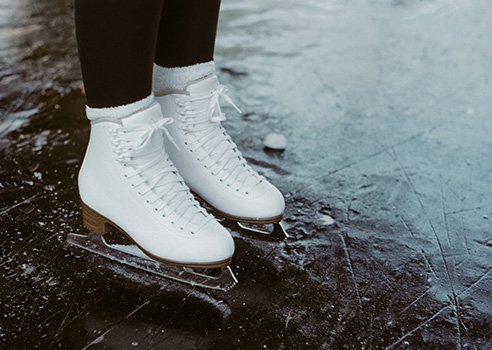Word count: 697 words
Reading time: Less than 3 minutes
Do you ever get stopped in your tracks by writing criticism? Here’s how you should deal with that particular type of “black ice”….
I’d heard the dire warnings on the morning news. “The roads are covered with black ice. It’s a skating rink out there.” I’d even had a text from one of my kids on the way to classes. “The buses are crazy-busy. Tell my sister to leave really early.”
Still, the weather didn’t stop me from going to meet a friend for coffee. How bad could it be? Walking down my front steps, I clung to the railing. I’d fallen down those stairs several years ago, and I wasn’t going to let it happen again. But I made it to the bottom without incident.
I’ve always walked to my weekly 9 am coffee-date – it’s a 25-minute stroll – and I like the way it wakes me up and gives me the time to think about writing. As I looked at the sidewalk, I could see the crystalline patterns of ice embedded in the concrete. I walked S-L-O-W-L-Y. Everything seemed to be fine.
When I passed the laneway, I saw a teenager doing that deliberate slip-slide thing so she could “skate” using her boots. I smiled. But I didn’t try it.
Feeling more confident, I picked up my speed ever so slightly and headed down Dunbar, the main street in my neighbourhood. Then, all of a sudden, WHOOSH. I was flat on my back. Although I fell in less than an instant, in my mind’s eye, the event took about 20 seconds. I can recall with startling clarity three distinct motions: sailing up into the air, my butt connecting with the pavement and the sickening thump as my head bounced on the sidewalk.
I lay there for a second, before calling out, “I’m okay.” A friend was standing at the bus stop nearby and she helped me get up. I quickly considered my options and decided to proceed to my coffee date, ensuring my steps were even more careful.
What does this have to do with writing? As I continued my walk, it struck me that the shaken, off-balance state I was in wasn’t terribly different from times when I’d taken a writing fall. A boss disliked something I’d written for him. An editor wanted a complete rewrite. A colleague shook his head at my work. This kind of reaction was always shocking, disheartening.
So, here’s my advice about how to make yourself more slip-proof:
1) Take warnings seriously. Just as I should have paid more attention to the radio warnings about black ice (for example, I could have walked on the grass lined boulevard instead of the sidewalk) you should try to respond, unresentfully, when someone important-to-you complains about your writing. Take another stab at the piece. Do a new mindmap. Get your boss to show you a piece of writing that he or she really likes and imitate it.
2) Get some help. I have whiplash from my fall so I’m going to get a massage today. If you need help with your writing it’s a bad idea to hope that things will miraculously recover. Problems that are ignored don’t get better – in fact, they generally worsen. At the very least, go to the bookstore or library and get some books on writing. Take a course. Get some coaching. (Your boss may even be willing to pay for any of these actions.)
3) Don’t let writing criticism stop you! We all run into roadblocks all the time. As the mother of triplets I can tell you that if I’d let my kids decide when we’d go for walks while they were small, we’d have never made it out the door. Set your own goals and do whatever it takes to achieve them.
Just as I continued to my coffee date – walking ever so much more carefully than I had when I’d started — you can write and be published if you are determined to make it happen.
Have you had any “falls” with your writing? What did you do about them? Please comment below. (If you don’t see the comments box, click here and then scroll to the end.)
Photo courtesy Ell Brown, Flickr Creative Commons


